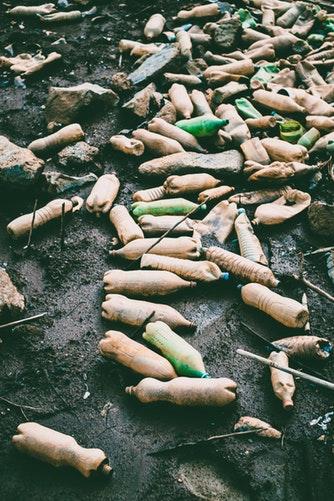Don't Throw It Out--Wear It! Plastic Recycling May Solve Fashion Pollution
- September 18 2018
- 3 min read
Don't Throw It Out--Wear It! Plastic Recycling May Solve Fashion Pollution

Old fishing nets, plastic bottles, and threadbare tires. These aren't things you would even begin to think of as textiles, but one eco-minded fashion firm is turning that waste into jackets, sneakers, and flip-flops in a rainbow of colors.
Spanish company Ecoalf has recently opened a store in Berlin, Germany, and according to spokeswoman Carolina Alvarez-Ossorio, "Plastic pollution is a huge topic right now--also within the industry." That industry would be the fashion industry.
Participants in a green tour of Berlin sit on a massive sofa made out of repurposed plastic bottles. They are treated to a history of Ecoalf's firm and their environmental philosophy. All around them hang minimalist t-shirts and padded coats, also made out of plastic bottles.
This plastic comes from 3,000 fishermen. They work along Spain's Mediterranean coast and catch liters in their nets along with the fish! Instead of throwing it back into the ocean, they now send it off to Ecoalf where it is processed into "sea thread."
Ossorio stated, "The challenge is not finding garbage--that is everywhere--but having the technology to transform it."
She added that the fishermen voluntarily take part in the process because they are concerned and worried about the worsening pollution they see.
While Ecoalf is offering one solution, the company's founder, Javier Goyeneche, founded the company back in 2009 due to a surprising lack of available recycled clothing. Goyeneche found that less than one percent of clothing is currently turned into new garments. What he did find for sale contained as little as five percent reused materials.
With news that our oceans will be more plastic than fish by the year 2050, companies like Ecoalf are doing their part to incorporate waste into their collections. Elusive designer duo Vin and Omi turn it into quirky, futuristic creations. More established designers, such as outdoor company The North Face, recently transformed the plastic bottles retrieved from three different American national parks into a line of t-shirts and bags. Sister company Patagonia has been using plastic to make their fleece jackets since 1993.
Even if recycling plastic bottles into clothing has been an obvious helping hand in delittering our planet, it still leaves an ecological footprint--even if that footprint is smaller than the one made by conventional fashion industries.
According to Vin and Omi, producing fabric made from recycled plastics uses 50 percent less energy and produces one-third less CO2 compared to using non-recycled plastics.
Other big fashion houses, such as Target, Zara, and Primark, as well as footwear companies like Nike and Adidas. are also jumping on the green fashion trend. The companies are hiring sustainability experts and and flaunting their recycling credentials. Swedish fashion giant H&M plans to make its entire business "circular," which involves recycling their garments. Anna Gedda, head of sustainability, said that the success of this would depend upon the development of new technologies. "Finding innovations to fill the technological gaps we have throughout our supply chain and bringing these new innovations to market fast enough are two of our biggest challenges."
Lucy Norris, Berlin-based professor of design research and material culture, said that recycling consortia are working on infrared sorting systems of second-hand clothing. This would separate different materials for recycling. They are also developing chemical reprocessing technologies that will be able to dissolve mixed fibers so materials like polyester and cotton can be extracted. "These emerging technologies are still at the prototyping stage," she says. She estimates it could be another 20 years before recycling technology will be able to keep pace with the ambition to keep textiles out of landfills and in circulation.
Gain access to Orders, Tracking, Custom Options and Much More!